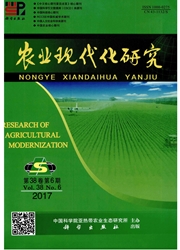

 中文摘要:
中文摘要:
乡村旅游是发展乡村经济、改善乡村人居环境、优化乡村地区产业布局的重要力量,乡村文化生态是乡村文化与自然环境的耦合、是维护乡村社会稳态延续的重要动力。基于文化生态理论,分析乡村旅游开发中面临的文化生态失衡问题,并探讨解决乡村文化生态失衡的路径。结果表明,在我国乡村旅游快速发展中,乡村文化生态建设在时间与空间两个层面上面临着亟待解决的问题:在时间层面上乡村传统文化正朝着丧失“原真性”的方向发生变迁,在空间层面上旅游开发破坏着乡村传统文化赖以存在的文化生态环境。乡村文化生态系统的固有特性、乡村旅游开发理念错位与技术良莠不齐、乡村居民参与旅游发展的不充分是导致乡村文化生态失衡问题的主要因素。因此,树立科学的旅游开发理念来指导合理的旅游开发模式,提升规划和设计水平为乡村旅游开发提供技术支持,建立良好的社区参与机制来保障乡村居民的社区参与权,是在乡村旅游发展中实现乡村文化生态建设的主要路径。
 英文摘要:
英文摘要:
While rural tourism plays an important role in developing rural economy, improving rural living environment, and optimizing rural industrial structure, rural cultural ecology can be considered as perfect combination of rural culture and natural environment, which give great momentum to the stabilization of rural society. Based on the cultural ecology theory, this paper analyzes the cultural and ecological imbalance in the development of rural tourism, and discusses the ways to solve the imbalance issues. Result shows that during the rapid development of rural tourism in China, the rural cultural ecology system faces two imminent problems demanding solutions from two perspectives:1) from time perspective, rural traditional culture has been losing its“authenticity”as time goes by;and 2) from space perspective, tourism developers have been destroying the environment of cultural ecology, which is the foundation of rural traditional culture. The intrinsic nature of rural cultural ecology system, the concept of misunderstanding and different techniques during rural tourism development, and the inadequate engagement of villagers in tourism development are major causes for the ecological imbalance of rural culture. Therefore, this paper suggests that the best ways to build the rural cultural ecology in rural tourism development include:to formulate a sound mechanism of tourism development to work out a reasonable tourism development pattern;to enhance the planning and designing level to provide technical support for rural tourism development, and to establish an effective community engagement mechanism to encourage the villagers’ participation.
 同期刊论文项目
同期刊论文项目
 同项目期刊论文
同项目期刊论文
 期刊信息
期刊信息
